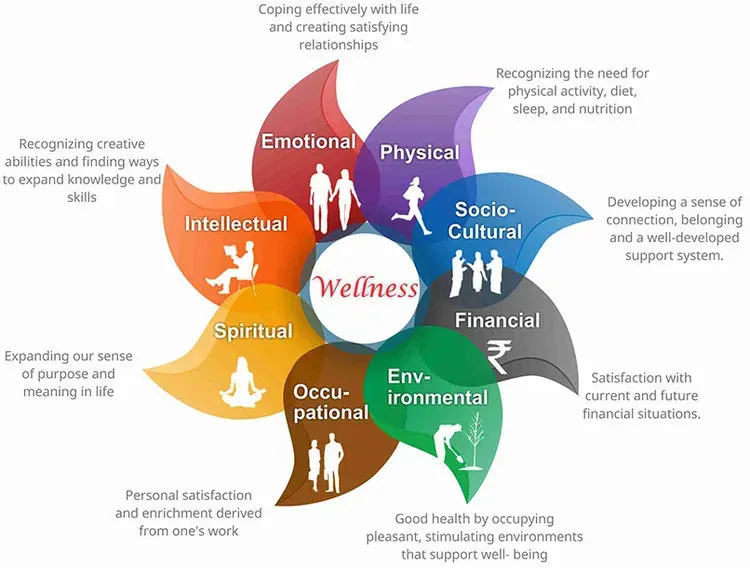Holistic Fitness: Embracing Mind, Body, and Soul Wellness
Holistic fitness is an integrative approach that transcends traditional exercise practices by uniting the mind, body, and spirit. This wellness philosophy recognizes the profound connection between physical fitness and mental well-being, promoting a balanced lifestyle through various mind-body practices. As individuals engage in holistic wellness, they discover benefits that encompass not only physical strength but also enhanced emotional stability and spiritual health. Through yoga and meditation, practitioners cultivate mindfulness, which in turn fosters resilience against stress and promotes overall life satisfaction. In this guide, we’ll explore the essential concepts, benefits, and trends surrounding holistic fitness, highlighting how it can transform your health experience beyond mere physicality.
Exploring integrative fitness reveals a comprehensive methodology that blends physical activity with mental and spiritual wellness. This all-encompassing approach encourages participants to embrace a variety of health practices that nurture both the body and mind. From thoroughly engaging in yoga classes and personal training to incorporating mindfulness techniques into daily routines, the focus is on achieving a balanced state of being. Thus, spiritual health becomes pivotal in fostering resilience, happiness, and overall well-being. By examining these diverse elements, we gain insight into how such holistic frameworks can create meaningful and sustainable lifestyle changes.
Understanding the Philosophy of Holistic Fitness
Holistic fitness embodies more than just engaging in a workout; it encompasses a mental, emotional, and spiritual journey towards achieving overall well-being. Unlike conventional fitness systems that prioritize physical improvements alone, holistic fitness integrates mind-body practices to cultivate a deep sense of balance and harmony. This philosophy recognizes that physical stamina is closely tied to mental clarity and emotional resilience. By fostering a holistic approach, individuals can cultivate a comprehensive lifestyle that enhances health throughout all dimensions of their being.
The core tenet of holistic fitness is the interconnectedness of health’s various aspects. When practitioners engage in mindful exercises such as yoga and meditation, they not only develop physical strength but also enhance spiritual health and mental well-being. Research indicates that those who actively participate in holistic fitness demonstrate significant reductions in stress and anxiety levels, yielding benefits that transcend physical capability. In essence, embracing holistic fitness involves nurturing the entirety of one’s self, thus promoting sustained health and wellness over time.
Exploring Mind-Body Practices in Holistic Fitness
Mind-body practices such as yoga, Tai Chi, and meditation play vital roles in holistic fitness strategies. These practices emphasize the connection between mental processes and physical actions, urging participants to engage fully in their body’s movements while enhancing mental focus and clarity. For instance, yoga not only improves flexibility and strength but also provides a framework for cultivating mindfulness and deep relaxation, essential for emotional health. When combined with traditional exercise routines, these mind-body approaches contribute to a well-rounded fitness experience.
Engaging in mind-body practices allows individuals to explore their inner landscapes, fostering self-awareness and promoting a sense of peace amidst life’s chaos. Meditation, for instance, has been scientifically proven to reduce stress and improve cognitive function, marking it as an indispensable component of holistic fitness. Furthermore, by incorporating these practices into their fitness regimens, participants often report greater satisfaction and mental clarity, thus reinforcing the idea that mental and emotional health is as important as physical prowess in the overall fitness landscape.
The Impact of Holistic Wellness on Everyday Life
Engaging in holistic wellness practices significantly impacts daily life, enhancing not only one’s physical capabilities but also emotional and mental states. Holistic wellness encourages individuals to cultivate habits that support their entire being, leading to a more balanced life. By incorporating elements such as nutrition, mindfulness, and exercise into daily routines, one can provide themselves the tools necessary to thrive both physically and emotionally. For instance, incorporating a few minutes of meditation into a daily routine can set a positive tone for the day, creating mental clarity and reducing stress levels.
The foundational principles of holistic wellness advocate for self-care through intentional choices. Whether it’s opting for nourishing foods that support mental health or engaging in fitness routines that incorporate emotional and spiritual elements, every action contributes to one’s overall state of wellness. As individuals start to notice the interconnected benefits, they embrace a lifestyle that prioritizes holistic approaches, leading to richer life experiences and more profound connections with themselves and their surroundings.
Integrative Fitness: A New Approach to Health
Integrative fitness embodies the fusion of traditional physical exercise with holistic wellness practices, creating a comprehensive approach that nurtures the whole person. This method acknowledges that true fitness transcends physical capabilities, emphasizing that emotional and mental health are integral components of overall well-being. Programs that incorporate mindfulness techniques alongside traditional exercises foster an environment where participants can grow holistically, enhancing both physical fitness and mental resilience.
Various integrative fitness programs have begun to gain popularity, as practitioners increasingly recognize the value of focusing on the whole self. This includes incorporating activities such as guided meditations into strength training or adding mindful breathing into aerobic sessions. By integrating these varied approaches, individuals not only enhance their physical strength but also develop the mental tenacity to face challenges, leading to a more fulfilled and harmonious life.
Nourishment for the Mind, Body, and Soul
Nutrition plays a pivotal role in the concept of holistic fitness, ensuring that all aspects of health—mind, body, and soul—are adequately nourished. A diet rich in whole foods, vitamins, and minerals can significantly affect one’s physical strength and mental clarity. Understanding how the food we consume impacts emotional health is crucial; for example, certain nutrients can help regulate mood and enhance cognitive function, making mindful eating a cornerstone of holistic health.
Holistic nutrition goes beyond simply counting calories or adhering to trends. It advocates for a balanced approach that takes into account how different foods affect our energy levels and emotional well-being. By prioritizing nutrient-dense meals, individuals can fuel their bodies more efficiently, empowering them to engage fully in mind-body practices and holistic fitness endeavors. This nourishment ultimately reinforces a more mindful and fulfilling lifestyle, as health becomes a matter of nurturing every dimension of one’s existence.
The Role of Community in Holistic Fitness
Engaging with a community that values holistic fitness can significantly enhance personal growth and motivation. Being part of a supportive group encourages individuals to explore not just physical fitness, but also mental and emotional health practices, leading to shared growth experiences. Communities often provide opportunities for collective learning, sharing insights from various mind-body practices like yoga and meditation, fostering a sense of belonging and connection that enhances individual wellness.
Moreover, participating in group fitness classes or workshops that focus on holistic fitness can enrich the learning process. Such environments enable individuals to explore integrative practices, discuss challenges, and celebrate successes, creating a culture of support. The validation and encouragement received from a community often empower individuals to embrace their holistic journeys fully, illustrating that health and wellness are achieved more effectively when pursued together.
Popular Modalities in Holistic Fitness
The landscape of holistic fitness is rich with diverse modalities that cater to varying individual preferences and wellness goals. Popular practices like yoga and Pilates focus on enhancing physical strength and flexibility while promoting mental clarity and inner peace. Each modality, whether it focuses on breath, movement, or mindfulness, offers unique benefits that contribute to a more balanced lifestyle, encouraging participants to connect with their bodies and minds deeply.
Moreover, newer approaches like dance fitness and mindful movement classes incorporate elements of fun and creativity into physical activity, making them accessible and enjoyable. These modalities recognize the playful aspect of fitness while emphasizing the importance of connecting with one’s self on multiple levels. By exploring these diverse practices, individuals can discover which modalities resonate most with their holistic fitness goals, enhancing their journey towards comprehensive wellness.
Stress Management through Holistic Fitness
Stress management is a significant component of holistic fitness, offering individuals tools to navigate the challenges of modern life. By integrating mindfulness techniques such as meditation and breathwork into physical exercise routines, individuals can cultivate the skills necessary to manage stress effectively. For instance, incorporating a few moments of deep breathing during a workout can help individuals center themselves, reducing anxiety and improving focus.
The practice of holistic fitness fosters resilience against stress by encouraging participants to connect with their body and emotions. This can lead to greater emotional regulation and the ability to respond to stressors in healthier ways. As stress reduction becomes an integral part of fitness routines, individuals often report enhanced mood and overall well-being, confirming the interconnected nature of mental and physical health.
Guided Meditation: A Key Element of Holistic Fitness
Guided meditation has emerged as a key element in the realm of holistic fitness, facilitating a deeper connection between the mind and body. This practice involves listening to a facilitator who provides direction on visualizations or relaxation techniques. By integrating guided meditation into fitness routines, individuals can enhance their mindfulness and awareness, which are crucial components of holistic wellness. It provides a structured approach to cultivating inner peace and emotional strength.
Practicing guided meditation not only aids in relaxation but also fosters an understanding of one’s thoughts and emotions. This self-awareness can lead to improved emotional health and support during challenging times, making it an essential practice for anyone engaged in holistic fitness. By prioritizing guided meditation, individuals enrich their fitness journey, ensuring that both physical and mental health are nurtured in tandem.
Frequently Asked Questions
What is holistic fitness and how does it benefit overall well-being?
Holistic fitness is an integrative approach to health that emphasizes the connection between the mind, body, and soul. By focusing on physical exercise, mindfulness, and nutrition, holistic fitness promotes improved mood, enhanced cognitive function, and greater resilience against stress. This comprehensive methodology fosters overall well-being and a balanced life.
How can mind-body practices enhance my holistic fitness routine?
Incorporating mind-body practices such as yoga and meditation into your holistic fitness routine can significantly enhance mental clarity, reduce stress, and improve emotional health. These practices encourage mindfulness and help create a harmonious balance between physical activity and mental wellness.
What types of exercises are included in holistic fitness?
Holistic fitness includes various forms of exercise that promote physical and mental well-being, such as yoga, Pilates, strength training, and aerobic workouts. It also emphasizes flexibility-enhancing practices and mindful movements, ensuring a well-rounded approach to fitness.
Can holistic wellness improve my emotional health?
Yes, holistic wellness can improve emotional health as it integrates physical activity with mental and spiritual practices. Engaging in holistic fitness routines promotes the release of endorphins, enhances mood, and encourages a positive mindset, leading to better emotional well-being.
What role does nutrition play in holistic fitness?
Nutrition is a fundamental component of holistic fitness, supporting both physical health and mental clarity. A balanced diet rich in nutrients helps nourish the body, thereby enhancing energy levels, improving mood, and promoting overall well-being.
How do I get started with integrative fitness practices?
To begin with integrative fitness practices, explore various types of exercises such as yoga or tai chi, incorporate mindfulness techniques like meditation into your routine, and educate yourself on nutritious eating. Joining a community focused on holistic fitness can also provide support and motivation.
What are the latest trends in holistic fitness?
Current trends in holistic fitness include integrative fitness programs that blend traditional training with holistic techniques, community initiatives offering workshops combining physical and mental training, and popular modalities like mindful fitness, which integrates personal training with meditation.
How does spiritual health relate to holistic fitness?
Spiritual health is an essential aspect of holistic fitness as it encourages individuals to connect deeply with their inner selves. Practices such as meditation and mindfulness foster spiritual well-being, supporting the overall balance of mind, body, and soul within a holistic fitness framework.
What benefits can I expect from practicing yoga and meditation for holistic fitness?
Practicing yoga and meditation as part of your holistic fitness routine can lead to improved flexibility, better stress management, enhanced focus, and overall emotional stability. These mind-body practices help cultivate a sense of calm and promote a deeper connection with oneself.
Is it necessary to join a gym to engage in holistic fitness?
No, it is not necessary to join a gym to engage in holistic fitness. You can practice holistic fitness at home or outdoors by incorporating exercises like yoga, meditation, and mindful movements into your routine, allowing you to find balance in your physical and mental health wherever you choose.
| Aspect | Details |
|---|---|
| Introduction to Holistic Fitness | Focuses on balance among physical, mental, and spiritual health. |
| The Concept of Holistic Fitness | Integration of physical exercise, mindfulness practices, and nutrition. |
| Benefits of Holistic Fitness | Improved mood, enhanced cognitive function, greater resilience against stress. |
| Current Trends | Integrative programs, popular modalities like Yoga and community initiatives. |
| Academic Insights | Higher satisfaction and lower anxiety reported by participants in holistic fitness programs. |
| How to Get Started | Explore exercises, practice mindfulness, educate on nutrition, join communities, track progress. |
Summary
Holistic fitness offers a transformative approach to achieving optimal health by harmonizing the mind, body, and soul. This holistic approach emphasizes the interconnectedness of various aspects of health, moving beyond mere physical exercise to include mental and spiritual wellness. By engaging in practices such as physical exercise, mindfulness, and balanced nutrition, individuals can experience significant improvements in mood, cognitive function, and stress management. As more people recognize the benefits of holistic fitness, it promotes a comprehensive lifestyle where wellness thrives on multiple levels, leading to a more fulfilling and sustainable way of living.
#HolisticFitness #MindBodySoul #WellnessJourney #HealthyLifestyle #InnerBalance








